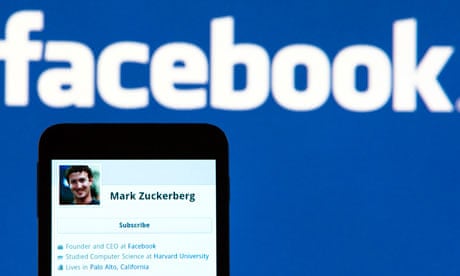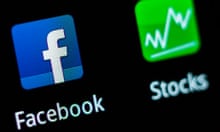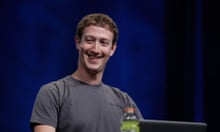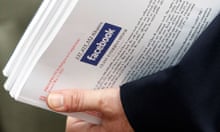On Friday, Facebook will finally become a public company. The hotly anticipated initial public offering (IPO) will be the largest tech company share sale ever and is expected to value the social network at over $100bn – more than the combined value of Nike and Goldman Sachs.
But not everyone is cheering Facebook on. Ahead of the sale of the century, here are five signals that suggest there may be choppy days ahead for Facebook's investors.
A lot of smart guys just decided to sell
Facebook's early investors are some of the most successful in Silicon Valley, and on Wednesday a lot of them decided to dump a lot more shares.
The social network giant announced Wednesday it was upping the number of shares it will offer in the IPO to 421.2m from 337.4m. The sale is now expected to value the firm at over $100bn – making it the biggest ever tech company IPO.
The company said Mark Zuckerberg, Facebook's chief executive, would not be selling more shares. But Peter Thiel, the famed Silicon Valley investor, will now be selling 16.8m shares, up from 7.7m shares.
Goldman Sachs more than doubled its planned share sale to 28.7m from the 13.2m the investment bank had initially planned to sell.
Tiger Global, a hedge fund, will sell to 23.4m from 3.4m. Tiger's head, Charles "Chase" Coleman III, earned an estimated $500m last year and is an expert in making money out of IPOs.
GM just gave them the boot
General Motors, one of the world's biggest advertisers, said this week that it was pulling its ads off Facebook.
The car firm is keeping its Facebook pages, which are free, but decided that its ads just aren't working.
GM doesn't spend a lot of money on Facebook, but this is a big blow. Facebook's massive valuation is based on expectations of a glorious future as the pre-eminent platform for display advertising online.
The car firm is not Facebook's only critic. Nate Elliott, Forrester analyst, recently wrote in a blog post: "One global consumer goods company told us recently that Facebook was getting worse, rather than better, at helping marketers succeed."
He said the firm was great at innovating for its users but added: "Facebook just doesn't pay nearly as much attention to marketing as it does to user experience. (Not surprising, given its founder's famous loathing for advertisers.)"
Research released this week by WordStream, a search engine software and marketing firm, concluded that Google is doing a better job than Facebook on display ads. It found the average click-through rate (CTR) of an ad on the Google Display Network is 0.4% – almost 10 times as high as the typical Facebook ad.
The price ain't right
At $100bn Facebook has a price to earnings (p/e) ratio of about 100. Don't nod off – p/e ratios are a rough measure of how fast a company is expected to grow. GM has a p/e of 6.6, which means it's a slow grower. Google has a p/e of 19 these days but had also had a p/e in the 100s when it did its IPO.
But Google was growing far faster than Facebook back then. Google doubled its growth in the year after its IPO. In its most recent quarter Facebook's growth had reached 44% and had actually slowed from the previous quarter. In part that was because Facebook's advertising business is seasonal, and the previous quarter included the run-up to Christmas.
Let's say Facebook starts growing faster this year, say 40-60% growth for the year. That's impressive stuff for any normal company. But Sam Hamadeh, chief executive of PrivCo, calculates that even with a p/e of 65, Facebook's shares are worth about $24-$25 a piece. Facebook increased its price range for the IPO this week to $34 to $38 a share.
Facebook had revenue of $3.6bn last year, which is impressive. But Hamadeh calculates the company needs to take a quarter of the online ads in the entire world to justify its present price.
Mobile dilemma
Facebook mentions the word "mobile" 123 times in its prospectus. The company had 845m monthly active users (MAUs) as of December 31, 2011. Some 425m were mobile users. And they don't make Facebook any money.
"We do not currently directly generate any meaningful revenue from the use of Facebook mobile products, and our ability to do so successfully is unproven," Facebook said in its prospectus. If Facebook was "unable to successfully implement monetization strategies for our mobile users," the company's revenue growth could be harmed.
Analysts have speculated that mobile is one reason that Zuckerberg was so keen to spend $1bn buying the mobile photo-sharing app Instagram. Not that it makes any money on mobile either.
Life moves quickly online. Facebook is a product of the laptop/PC age. It's not yet proven it can make it in the mobile era.
Management
Mark Zuckerberg got where he is today by doing exactly what he wanted. When Facebook goes public he will still be its biggest shareholder and will have voting control over 55.8% of the company's shares.
Zuckerberg clearly believes life will continue as normal after the IPO. As Facebook states in the prospectus the firm "prioritizes our user engagement over short-term financial results, and we frequently make product decisions that may reduce our short-term revenue or profitability."
That's fine when you are a private company but as other tech stars including the Google boys and Amazon have found, Wall Street investors soon tire of wunderkinds who don't deliver quarter after quarter after quarter. Zuckerberg was going to ring the opening bell at Nasdaq, the stock exchange that will soon be home to Facebook. Now he's decided to celebrate in Silicon Valley. It's clear where his loyalties lie. Betting on Facebook means betting that Zuckerberg has a second act in which he can learn to value his new investors as highly as he values Facebook.




Comments (…)
Sign in or create your Guardian account to join the discussion